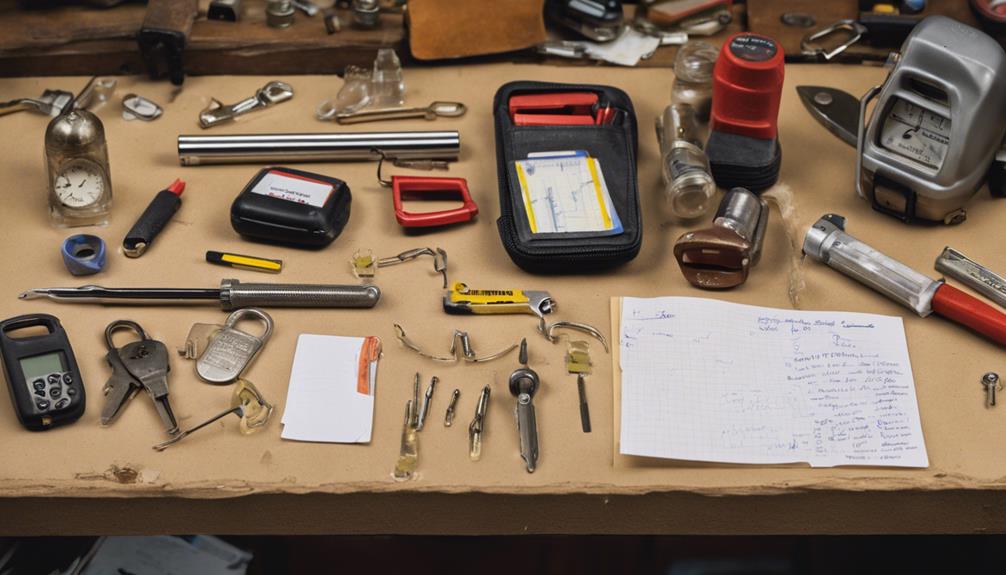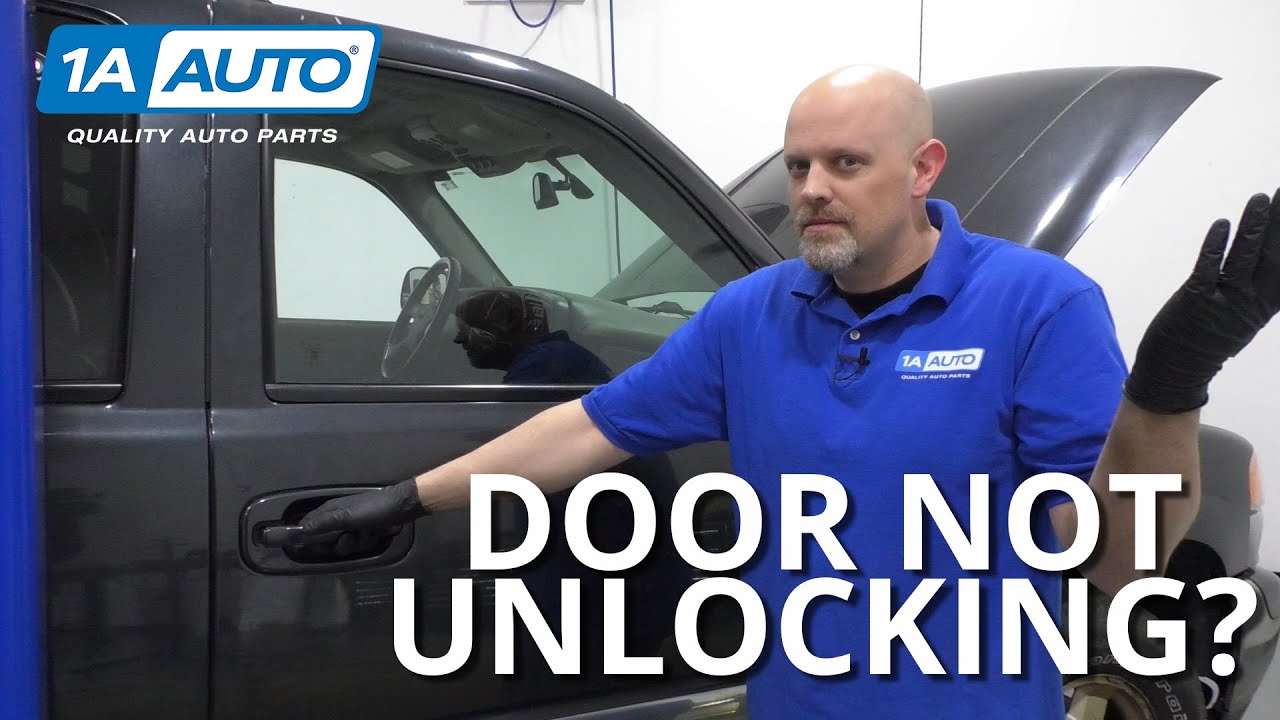To prepare for an emergency lock replacement, start by understanding common lock issues like wear, rust, and jamming. Research local locksmiths, checking for 24/7 service and customer reviews. Gather tools like screwdrivers, pliers, and a replacement lock kit. Create a contact list of trusted locksmiths and friends with lock experience. Assess your security needs by considering the property type and valuable items. Develop a backup plan, including spare keys and emergency contacts. Familiarize yourself with different lock types to act quickly in emergencies. By following these steps, you'll set yourself up for success in urgent situations.
Key Takeaways
- Research and compile a list of trusted local locksmiths who provide 24/7 emergency services for quick assistance during lock issues.
- Assess your security needs by evaluating your property type, location, and access points to determine appropriate lock solutions.
- Gather necessary tools, including a screwdriver set, pliers, utility knife, measuring tape, and a replacement lock kit for efficient replacements.
- Secure spare keys with trusted individuals or in discreet lockboxes to prevent delays during emergency situations requiring lock access.
- Develop a backup plan with emergency contacts, budgeting for potential lock replacements, and understanding local resources for additional support.
Understand Common Lock Issues
When dealing with locks, it's important to understand common issues that can arise. Locks can wear out over time, leading to problems like sticking or jamming.
Rust can greatly impact a lock's functionality, making it vital to address any signs of corrosion immediately. If you notice difficulty turning the key or hearing unusual sounds, it's important to address these signs early.
Knowing what to do before a lock fails can save you from a stressful situation later on. Regular maintenance is a key part of lock replacement readiness.
Lubricating your locks with graphite powder helps prevent rust and guarantees smooth operation. Additionally, inspecting your locks for wear or damage can provide insight into when a replacement might be necessary.
If you realize your locks are too old or malfunctioning, it's better to take action sooner rather than later. For more detailed information, consider reading about when to replace rusty locks.
Identify Trusted Locksmiths
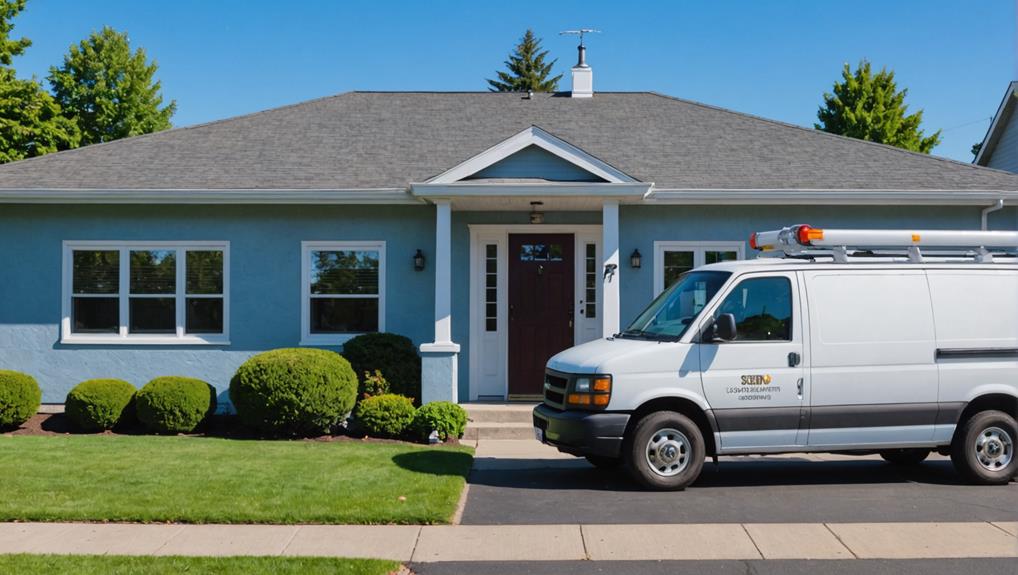
When you need a locksmith, it's essential to research local options to find reliable professionals.
Start by asking friends or family for recommendations and check online reviews to gauge their reputation.
Make certain to verify their credentials and experience before making a decision, as this will help guarantee you get quality service when you need it most.
Additionally, consider asking potential locksmiths specific questions about their license and insurance to further confirm their legitimacy.
Research Local Options
Finding a reliable locksmith is vital for a smooth emergency lock replacement. When you're in a jam, having an emergency locksmith contact you can trust makes all the difference.
Start by researching local options to guarantee you're prepared for any situation.
Consider the following aspects when evaluating potential locksmiths:
- Reputation: Look for reviews and testimonials from previous customers.
- Availability: Confirm they offer 24/7 services for lockout preparation.
- Services Offered: Check if they handle various types of locks and emergency scenarios.
- Response Time: A quick response can be critical during an emergency lock plan.
- Community Involvement: Support locksmiths who are active in your community and prioritize serving others.
Verify Credentials and Experience
After you've narrowed down your list of potential locksmiths, it's time to verify their credentials and experience. This step is essential in preparing for a lock emergency. Start by checking if they're licensed and insured. A legitimate locksmith should have the necessary certifications that demonstrate their training and expertise. You can often find this information on their website or by asking directly.
Next, look for customer reviews and testimonials. These can provide insight into their reliability and the quality of their services. Ask for references if you need more assurance.
It's also wise to inquire about their experience specifically with emergency lock replacements, as this can differ from standard lock services.
Consider the locksmith's response time as part of your emergency lock replacement tips. A trustworthy locksmith should be able to handle urgent situations promptly.
Gather Necessary Tools
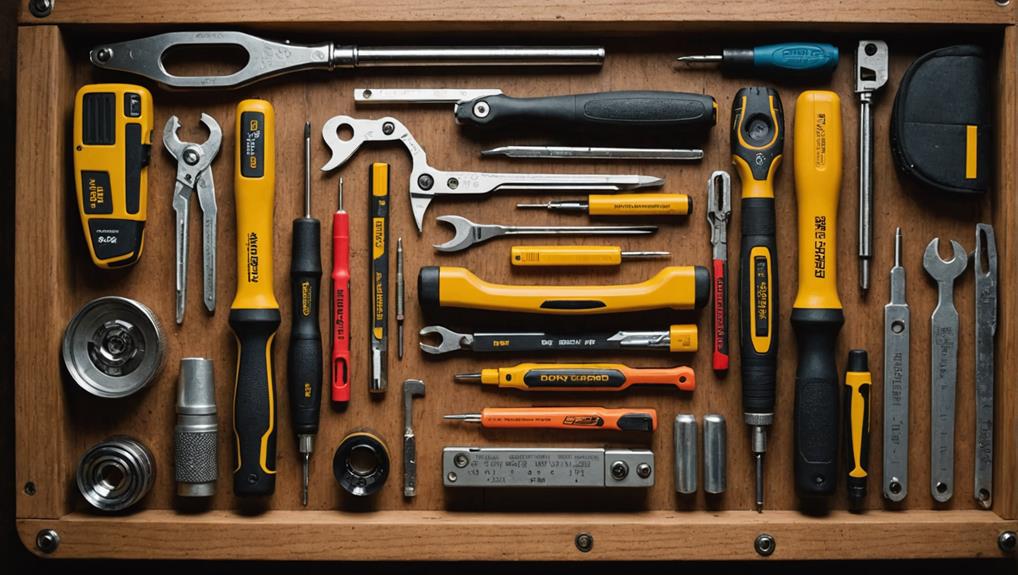
Having the right tools on hand is essential for a successful emergency lock replacement.
You'll want to make certain you're prepared to help others efficiently and effectively. To make the process smoother, consider including specialized tools for lock re-keying, such as those mentioned in essential tools for DIY and pro lock re-keying.
Gather the necessary tools to tackle the task with confidence and professionalism. Here's a list of items you should collect before diving in:
- Screwdriver set: A mix of flathead and Phillips to handle various screws.
- Pliers: Handy for gripping and twisting stubborn components.
- Utility knife: Useful for cutting through any packaging or debris.
- Measuring tape: Ensures you get the right dimensions for replacements.
- Replacement lock kit: The main component for your project, tailored to the specific lock type.
Create a Contact List
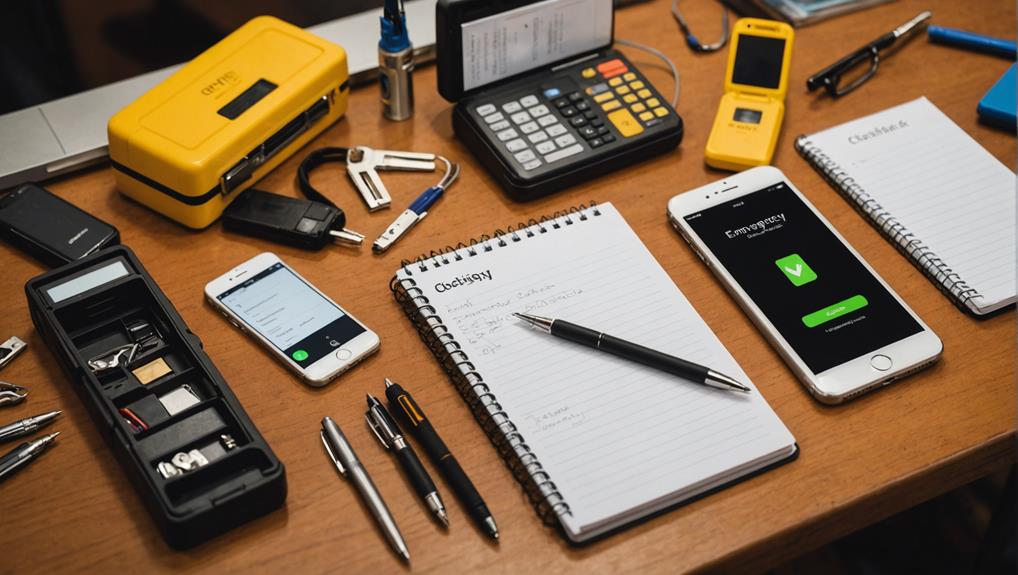
As you prepare for an emergency lock replacement, creating a contact list is essential to guarantee you can quickly reach out for help or advice if needed.
Start by jotting down the names and phone numbers of local locksmiths you trust. It's important to choose a locksmith who's reliable and known for their prompt service, especially during emergencies.
Consider including those who offer 24/7 services, as emergencies don't always happen during business hours. Choosing a Trustworthy Emergency Locksmith can make all the difference in a stressful situation.
Next, add contacts for friends or family members who've experience with lock replacements. They may offer valuable insights or assist you during the process.
If you're part of a community group or neighborhood watch, list their contacts too, as they might provide recommendations or support.
Don't forget to include your property's management or maintenance contacts if you live in an apartment or rental. They might've preferred locksmiths or specific procedures to follow in case of a lock emergency.
Assess Your Security Needs
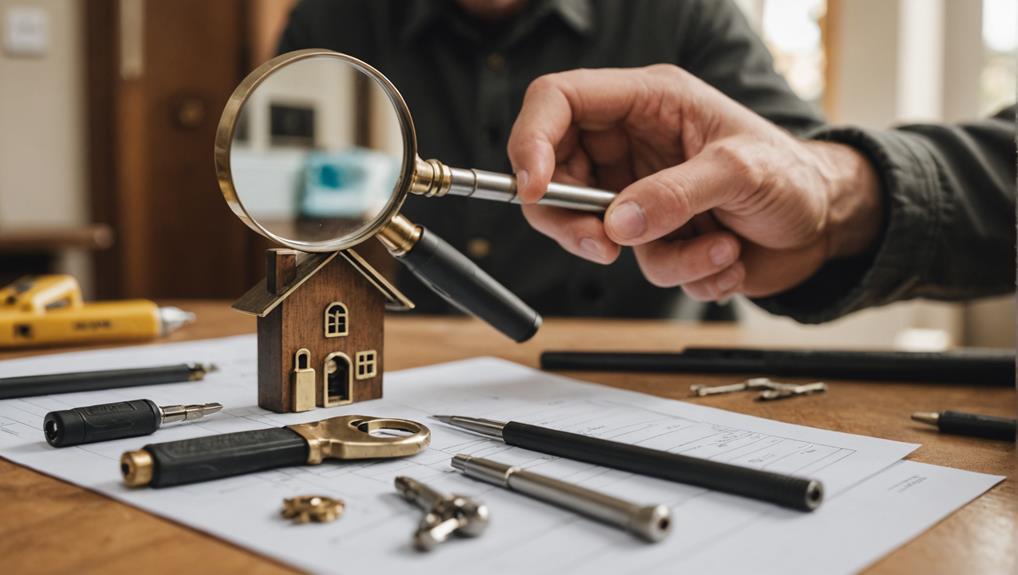
Evaluating your security needs is essential before an emergency lock replacement. You need to assess your current situation and determine what level of security will best protect those you serve.
Understanding the importance of lock replacement for businesses can guide your decision-making process. Think about the unique circumstances you face and the vulnerabilities that may exist.
Consider these key points to help guide your evaluation:
- Type of property: Is it a home, office, or community center?
- Location: Are you in a high-crime area or a relatively safe neighborhood?
- Access points: How many doors and windows require secure locking mechanisms?
- Valuable items: What possessions or information need extra protection?
- Community involvement: Are there shared spaces or resources that require heightened security?
Develop a Backup Plan

To handle an emergency lock replacement smoothly, you need a solid backup plan.
Start by identifying key emergency contacts who can help you in a pinch, and make sure you've secured spare keys in safe locations.
Additionally, consider familiarizing yourself with the cost factors of lock replacement, as this knowledge will help you anticipate any expenses that might arise during an emergency.
This way, you'll have peace of mind knowing you're prepared for any unexpected situations.
Identify Emergency Contacts
When an emergency lock replacement is needed, having a list of reliable contacts can make all the difference.
You want to guarantee you have people you can reach out to for help or advice.
Here's how to identify those important contacts:
- Trusted friends or family: They can offer quick support or even lend you tools if needed.
- Local locksmiths: Keep a few recommended locksmith numbers handy for immediate service.
- Neighbors: They can be a valuable resource for information about local services or even temporary shelter.
- Insurance agent: Your agent can guide you on coverage for lock replacements.
- Community service organizations: They may provide assistance or referrals during emergencies.
Secure Spare Keys
Having reliable contacts is just the first step in guaranteeing your safety and security during an emergency lock replacement.
Next, you need to secure spare keys. Having a backup plan means you won't feel helpless if you lose your primary keys or your lock needs immediate attention.
Start by identifying trusted friends, family members, or neighbors who can hold onto a spare key for you.
Make sure they're reliable and accessible, so you can count on them in a pinch.
Consider using a lockbox or a key vault, which can be discreetly placed outside your home.
This way, you can provide easy access to a trusted person during an emergency.
It's also a good idea to check your spare keys regularly.
Confirm they're in good condition and that the person holding them knows how to use them.
Your goal is to prevent delays when you need assistance.
Stay Informed on Lock Types

Understanding the various types of locks is essential for anyone preparing for an emergency lock replacement. By familiarizing yourself with these different locks, including the superior protection offered by high-security locks, you can better serve others during a crisis.
When you know what you're dealing with, you can act quickly and efficiently, helping yourself and those around you.
Here's a quick overview of common lock types:
- Deadbolts: These provide extra security, making it harder for intruders to gain access.
- Smart locks: These offer keyless entry, allowing you to control access via your phone or keypad.
- Padlocks: Great for securing gates or storage units, they come in various sizes and styles.
- Knob locks: Typically found on doors, they're often used in conjunction with deadbolts for added safety.
- Mortise locks: These are installed into a pocket in the door, offering a sturdy and secure option.
Frequently Asked Questions
How Long Does a Typical Lock Replacement Take?
A typical lock replacement usually takes about 30 minutes to an hour.
It depends on the type of lock and your experience level. If you're working with a simple deadbolt, you'll likely finish quicker.
However, if you're dealing with more complex systems, it could take longer.
Don't rush it; ensuring the job is done correctly is key.
Always have the right tools handy to make the process smoother and more efficient!
What Are the Signs My Lock Needs Replacement?
You might think all locks last forever, but that's not true.
If your key sticks, turns with difficulty, or the lock feels loose, it's time to take action. You should also be wary of any rust or visible damage.
If your lock's not securing your door firmly, it's an essential sign it needs replacement. Trust your instincts; a reliable lock is important for your safety and peace of mind.
Can I Replace a Lock Myself Without Professional Help?
Yes, you can replace a lock yourself without professional help. It's a straightforward process if you've got the right tools and a bit of patience.
First, gather your supplies, like a screwdriver and the new lock.
Follow the manufacturer's instructions closely, and don't hesitate to watch tutorial videos for guidance.
Just take your time, and you'll not only save money but also gain a sense of accomplishment from handling the task yourself.
How Much Does an Emergency Lock Replacement Usually Cost?
An emergency lock replacement usually costs between $100 and $300, depending on the type of lock and the service provider.
You might find additional fees for emergency services, especially after hours.
It's smart to get multiple quotes to guarantee you're getting a fair price.
If you're in a pinch, some locksmiths offer flexible payment options, so don't hesitate to ask about those.
Being prepared can help you manage costs effectively.
Are There Warranties for New Locks or Locksmith Services?
Yes, there are warranties for new locks and locksmith services.
When you buy a lock, check for the manufacturer's warranty, which often covers defects.
Many locksmiths also provide a service warranty for their work, guaranteeing they'll return to fix any issues that arise shortly after installation.
Always ask about these warranties before making a purchase—it's a great way to protect your investment and guarantee peace of mind in case something goes wrong.
Conclusion
When you're faced with an emergency lock replacement, being prepared can make all the difference. Imagine coming home after a long day, only to find your lock's malfunctioning. By having a plan, trusted contacts, and the right tools ready, you can quickly regain your peace of mind. Remember, it's not just about the lock—it's about feeling safe in your own space. Don't wait for an emergency to happen; take the time now to secure your home.

